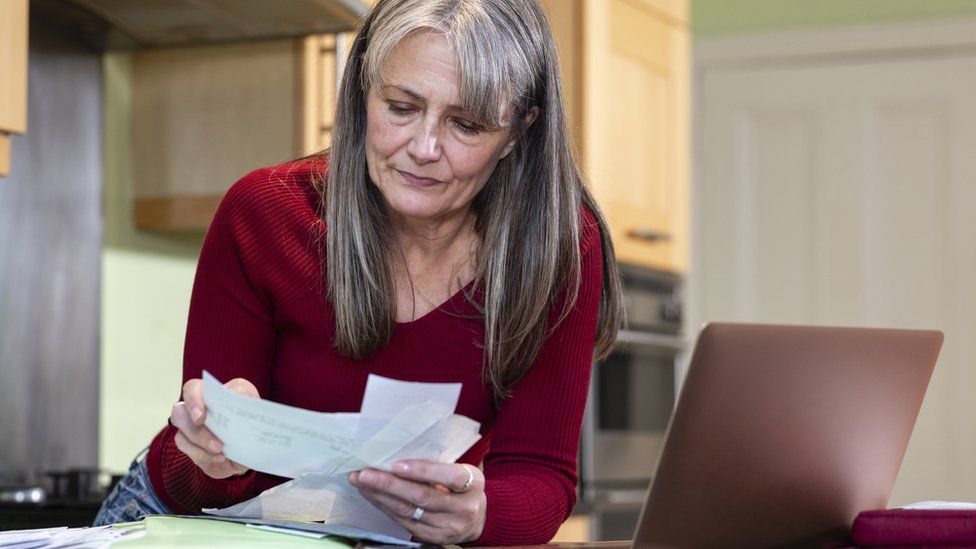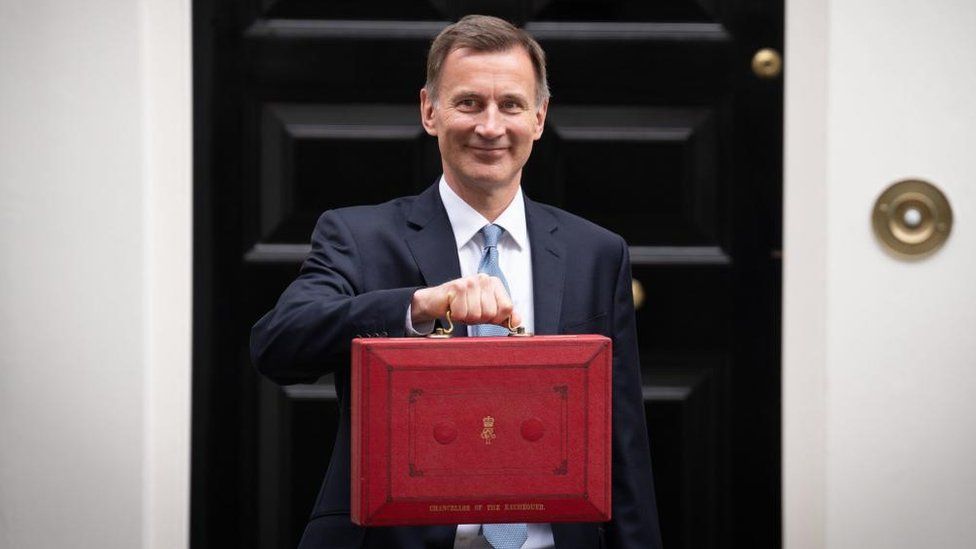
Chancellor Jeremy Hunt will deliver his 2024 spring Budget on Wednesday 6 March.
He will say how much money the government plans to take in taxes, and what it will spend it on.
This spring there is a lot of focus on whether he will cut taxes ahead of the election.
What is the Budget?
Each year, the chancellor of the exchequer – who is in charge of the government’s finances – makes a Budget statement to MPs in the House of Commons.
The speech outlines the government’s plans for raising or lowering taxes. The Budget also includes big decisions on spending on health, schools, police and other public services.
The Treasury publishes a report alongside the Budget, which sets out further details about the measures announced, and what they will cost.
After the statement, MPs will spend several days debating the Budget.
They will then be asked to approve the tax proposals, and the government will introduce a Finance Bill to turn the Budget proposals into law.
- How the government raises and spends £1 trillion a year
- Autumn Statement 2023: Key points
- Budget 2023: Key points
When is the 2024 Budget?
The 2024 spring Budget is on Wednesday, 6 March.
The speech usually starts at about 12:30 UK time and lasts about an hour. It will be broadcast live on the BBC iPlayer and on the BBC news website.
Labour leader Sir Keir Starmer will give his response to the Budget as soon as Mr Hunt sits down.
After the speech, the independent Office for Budget Responsibility (OBR) – which monitors government spending – will publish an independent assessment of how the economy is doing.
- Who is Jeremy Hunt, the chancellor?
How is the UK economy doing?
At the end of last year, the economy was in recession. That means it contracted, rather than grew, between July and September and then shrank again between October and December.
But it was a shallow recession, meaning economic output did not suffer a sharp, deep fall, which would have put more businesses at risk and people out of work. And the Bank of England’s governor has said he does not think the country is still in recession.
Even if the economy is growing again, many people are still feeling the pinch, after two years of rising prices.
Growth for the whole of last year was just 0.1% – although figures measuring the size of the economy can be revised upwards or downwards several months later.
- What is a recession and how could it affect me?
- How does government borrowing work?
- How will the UK economy compare to others in 2024?
What could be in the Budget?
The government has hinted that it wants to cut taxes. But it has also tried to manage expectations by suggesting there may not be enough money to make big changes.
Recent figures on government borrowing suggest he could have a few billion pounds to play with, but only because some tax rises have already been accounted for.
National Insurance rates
The big headline-grabber would be a cut to the basic rate of income tax.
Cutting it by 1p would cost £7bn, according to the Resolution Foundation – an independent think-tank focused on improving living standards for those on low to middle incomes.
Or, the government could spend the same amount cancelling the personal allowance freeze. Allowing the threshold of when you start paying income tax to rise in line with inflation would mean lots of people paying less tax.
- National Insurance calculator: What will I pay now?
99% mortgages
According to reports in the Financial Times newspaper, the chancellor is looking at introducing 99% mortgages.
This could make it easier for first-time buyers to get on the housing ladder, only needing a 1% deposit while the government acts as a partial backer.
But some experts have raised concerns that such a move would not address the need to build more homes across the UK, and owners could end up in negative equity if the value of their home goes down, where their debts are more than the value of the property.
Inheritance tax
A cut in inheritance tax has generally been described as a break for the better-off. You do not pay inheritance tax on estates worth less than £325,000.
Nevertheless, the chancellor may look at changing that threshold to reflect rising house prices and investments.
- What is inheritance tax and who pays it?
Abolishing it altogether would cost £7bn, according to think tank the Institute for Fiscal Studies, and benefit just 4% of the population.
Childcare
Childcare reforms take effect from April to expand the free sessions available to families.
But in January, the chancellor acknowledged that the High Income Child Benefit charge could be “unfair”.
Claimants currently have to pay back 1% of their family’s child benefit for every extra £100 they earn over the £50,000 threshold each financial year.
One person earning £60,000 wouldn’t get any child benefit under the current rules, while a dual-income family with two parents earning £50,000 would receive the full amount.
The chancellor may decide to raise the threshold at which this applies.
- How does 15 hours and 30 free hours childcare work?
Fuel duty
Fuel duty has been frozen since 2011, making it hard to take the brake off now.
But a 5p fuel duty increase has been pencilled in for later in March.
The Resolution Foundation calculates scrapping it would cost £2bn next year.
Holiday lets
The government has already said it is clamping down on holiday lets.
We may hear more about new controls on holiday lets in England, which will be introduced in the summer to stop local people from being unable to afford living in their own community.
The changes mean people may need to seek permission from the council to turn their home into a short-term let.
Does the Budget affect all parts of the UK?
Some parts of the Budget, such as defence spending, affect the whole of the UK.
Others, such as education, only affect England. This is because Scotland, Wales and Northern Ireland make their own decisions on this policy area.
Scotland has income tax-raising powers, which means its rates differ from the rest of the UK.
The Scottish government set out its budget for the 2024-2025 tax year in December.
From April, those earning between £75,000 and £125,140 in Scotland will pay a new “advanced” rate of 45%, and the top rate of tax is increasing to 48%.
If the government announces extra spending on areas that only affect England, the other nations get an equivalent extra sum of money to spend as they choose, according to a rule called the Barnett formula.
Related Topics
- HM Treasury
- Economics
- UK taxes
- Cost of Living
- UK economy
- Jeremy Hunt
-
Budget to be held on 6 March, says Treasury
-
27 December 2023

-





